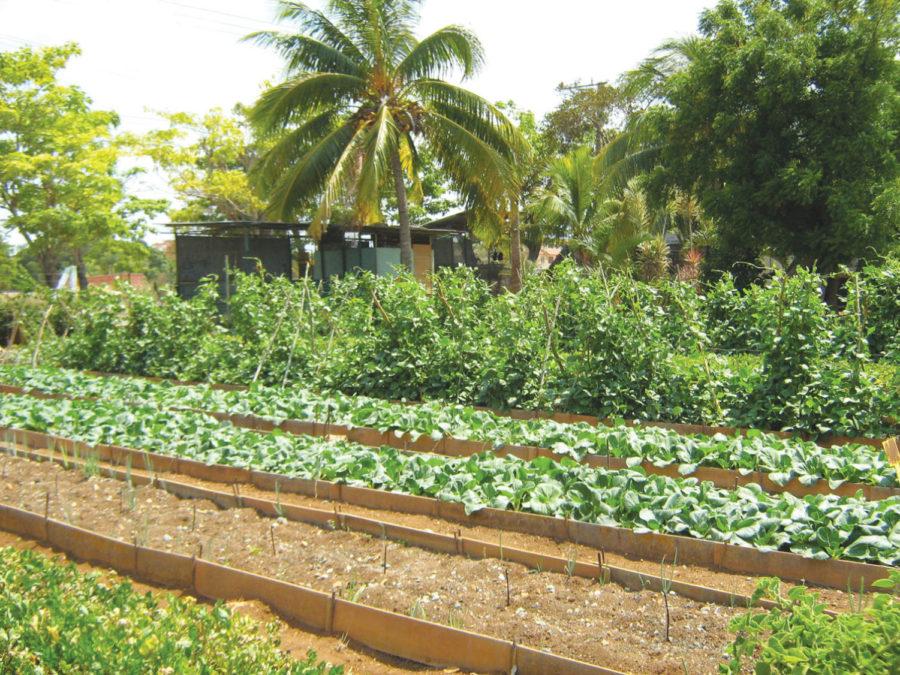Iowa State students, faculty visit Cuba
Photo courtesy of Angie Carter
Cuba has moved from modern conventional agriculture to organic production, due to the lack of petroleum, fertilizers and other resources.
June 6, 2011
Professors Steven Fales and Mary Wiedenhoeft of the Iowa State agronomy department took five graduate students to Cuba from May 7 to May 16 to learn about the country’s food supply system.
“I had originally thought about taking some undergraduate students down,” Fales said. “Then I found out that undergraduates can’t go to Cuba unless they spend at least 10 weeks there.”
The students who accompanied Fales and Wiedenhoeft are enrolled in Iowa State’s sustainable agriculture graduate program, a broad interdisciplinary offering that attracts students from community and regional planning, landscape architecture, horticulture and other areas of study.
“I was interested in talking to farmers and different people involved in Cuba’s food system, because it’s very different from ours,” said Angela Carter, graduate in sociology.
The group worked with Global Exchange, a San Francisco nonprofit organization that acts as a middleman between travelers and the U.S. Treasury Department, which oversees travel to Cuba.
Those who enter Cuba without the Treasury Department’s approval risk a $70,000 fine, Fales said.
“They identify groups to go on ‘directed visits’ . . . this one was labeled as a research project,” Fales said.
After submitting a series of applications and applying for the necessary licenses, they were cleared for travel.
“It was not cheap,” Fales said. “All told, it was probably around $2700 [per person].”
Airline tickets from Miami to Cuba alone cost about $400, Fales said.
The students were awarded partial scholarships to defray travel expenses. However, the rest of the money came out of their own pockets.
Clare Cardinal-Pett, professor of architecture, went to Cuba three times between 1999 and 2001.
“It has always been possible for people to travel to Cuba,” Cardinal-Pett said. “Under the Clinton administration it was a lot easier to get those permissions to go. During the Bush administration it became very difficult to get those permissions.”
New rules issued by the Obama administration are somewhat more relaxed, but tourism is still frowned upon.
Fales said the idea to visit Cuba first occurred to him while he was teaching Agronomy 342, which explores issues of worldwide “hunger, poverty, and social justice — or lack thereof — as they relate to people trying to feed themselves.” He saw parallels between Cuba and America that he felt would make the trip south worthwhile.
“[Cuba] is a model of what a society did when it reached peak oil,” Fales said. “It’s a glimpse into what might happen if we lost our energy-intensive systems here in this country, which is not a remote possibility.”
After the collapse of the Soviet Union in the early 1990s, Cuba was left without petroleum, fertilizer, and other resources necessary for modern conventional agriculture.
“When those were taken away, they moved to organic production,” Fales said. “They radically retooled their economy to become self-sufficient on domestic production of food, which was a huge challenge.”
The United States maintains an embargo on trade with Cuba, but an exception is made for Tyson chicken, Fales said.
Fales and the others did not sample Cuba’s luxurious vacation resorts, nor did they want to. They were solely interested in learning about Cuba’s agricultural practices.
“A beach is a beach is a beach,” Fales said.
The group spent their first few days in Cuba learning about its government and the structure of its food system. They spent the remainder of their trip touring different farms, schools and historical sites.
“We spent the majority of our time in Havana, and we visited with people who were involved in the government on several different levels,” Carter said.
The architect in charge of renovating Havana’s 15th and 16th-century Spanish buildings led the group on a walking tour of the city.
“Most of it was very educational,” said Fales.
Even so, “It’s heavily centrally planned and centrally enforced, so it’s hard to get a true sense of what it’s like to be a Cuban,” he said.
Carter was interested to learn that the Cuban government’s agricultural organizations mandate a certain number of female board members.
“I thought, ‘Oh, how different that is from the United States, where we have so few women represented on our national boards and commodity groups,'” Carter said.
Fales agreed with Carter, stating, “The commitment to social and economic equality is really striking to me.”
Cardinal-Pett said the Cuban people, though they tend to distrust the American government, treat all visitors with respect.
“There were absolutely no negative feelings whatsoever,” Cardinal-Pett said. “They are really wonderful. They’re very funny; they’re really resourceful; they’re really friendly — outgoing. It was a pleasure. I have to say I really like them a lot. That was one of the reasons I kept going back.”
“The thing I concluded from all of this is that there is no strategic reason for us to maintain an embargo on Cuba,” Fales said. “They desperately need food.”







